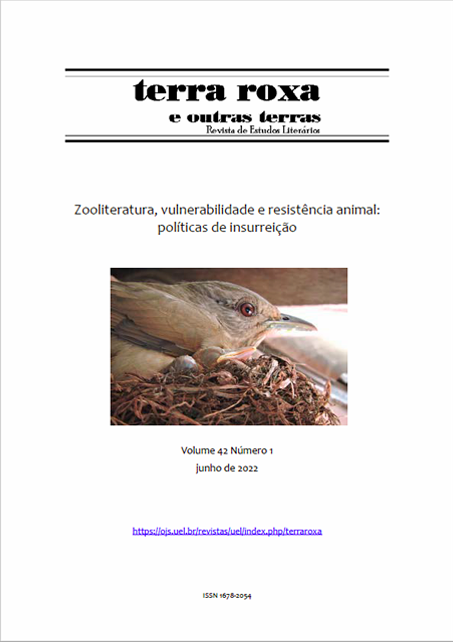The literary dignity of Sete-de-ouros
DOI:
https://doi.org/10.5433/1678-2054.2022v42p96-108Keywords:
Animal studies, characters, Sagarana, Guimarães RosaAbstract
This article is the result of a research concerning the animal issue from the reading of "O burrinho pedrês" by Guimarães Rosa, published in 1946, in Sagarana. This work is guided by the study regarding on the concepts of "character", proposed by Beth Brait, and "life", based on Giorgio Agamben. Avoiding allegorical or symbolic readings, we aim to analyze the compositional procedures of Sete-de-Ouros. We understanding that Rosa's literature recognizes that animals can feel and suffer. Using different bibliographic references regarding the animal and critical texts on Guimarães Rosa, it is suggested the support of theoretical texts by Antonio Candido, Benedito Nunes, Gabriel Giorgi, Julieta Yelin, Maria Esther Maciel, Suzi Frankl Sperber, among others.
Downloads
References
ABBAGNANO, Nicola. Dicionário de filosofia. São Paulo: Martins Fontes, 2012.
AGAMBEN, Giorgio. Homo sacer: o poder soberano e a vida nua I. Trad. Henrique Burigo. Belo Horizonte: Editora UFMG, 2002.
AGAMBEN, Giorgio. O aberto. O homem e o animal. Trad. Pedro Mendes. 2ª edição. Rio de Janeiro: Civilização brasileira, 2017.
AGAMBEN, Giorgio. O uso dos corpos. Trad. Selvino Assmann. São Paulo: Boitempo, 2017.
BOSI, Alfredo. História concisa da literatura brasileira. São Paulo: Cultrix, 2006.
BRAIT, Beth. A personagem. São Paulo: Ática, 1985.
CANDIDO, Antonio. A educação pela noite & outros ensaios. São Paulo: Ática, 1989.
CANDIDO, Antonio. A personagem do romance. Antonio Candido et al. A personagem de ficção. São Paulo: Perspectiva, 2007. p. 51-80.
CHKLOVSKI, V. Arte como procedimento. Trad. Dionísio de Oliveira Toledo. Teoria da literatura: formalistas russos. Porto Alegre: Globo, 1976. p. 39-56.
CHKLOVSKI, V. Arte como procedimento. Trad. David Gomiero Molina. RUS, São Paulo, v. 10, n. 14, p. 153-176, 2019. Disponível em: https://doi.org/10.11606/issn.2317-4765.rus.2019.153989. DOI: https://doi.org/10.11606/issn.2317-4765.rus.2019.153989
DERRIDA, Jacques. O animal que logo sou (A seguir). Trad. Fábio Landa. São Paulo: Editora UNESP, 2002.
DESCARTES, René. Discurso do método. Trad. Maria Ermantina Galvão. São Paulo: Martins Fontes, 1996.
GIORGI, Gabriel. A vida imprópria. Histórias de matadouros. Maria Esther Maciel. Pensar/escrever o animal: ensaios de zoopoética e biopolítica. Florianópolis: Editora da UFSC, 2011. p. 199-220.
GIORGI, Gabriel. Formas comuns: animalidades, literatura, biopolítica. Trad. Carlos Nougué. Rio de Janeiro: Rocco, 2016.
LEONEL, Maria Célia de Moraes. Guimarães Rosa: Magma e gênese da obra. São Paulo: Unesp, 2000
LESTEL, Dominique. As origens animais da cultura. Trad. Maria João Batalha Reis. Lisboa: Instituto Piaget, 2001.
LESTEL, Dominique. A Animalidade, o humano e as "comunidades híbridas". Maria Esther Maciel, org. Pensar/escrever o animal: ensaios de zoopoética e biopolítica. Florianópolis: Editora da UFSC, 2011. p. 23-53.
MACIEL, Maria Esther. Poéticas do animal. Maria Esther Maciel. Pensar/escrever o animal: ensaios de zoopoética e biopolítica. Florianópolis: Editora da UFSC, 2011. p. 85-101.
MACIEL, Maria Esther. Literatura e animalidade. Rio de Janeiro: Civilização Brasileira, 2016.
MOISÉS, Massaud. Dicionário de termos literários. São Paulo: Cultrix, 2004.
NUNES, Benedito. O animal e o primitivo: os outros de nossa cultura. Maria Esther Maciel. Pensar/escrever o animal: ensaios de zoopoética e biopolítica. Florianópolis: Ed. UFSC, 2011. p. 13-22. DOI: https://doi.org/10.5801/ncn.v14i1.605
ROSA, Guimarães. Magma. Rio de Janeiro: Nova Fronteira, 1997.
ROSA, Guimarães. Sagarana. Rio de Janeiro: Nova Fronteira, 2001.
ROSA, Guimarães. Ave, palavra. Rio de Janeiro: Nova Fronteira, 2009.
ROSENFIELD, Kathrin Holzermayr. Desenveredando Rosa: a obra de J. G. Rosa & outros ensaios rosianos. Rio de Janeiro: Topbooks, 2006.
SPERBER, Suzi Frankl. Caos e cosmos: leituras de Guimarães Rosa. São Paulo: Duas Cidades, 1976.
SPERBER, Suzi Frankl. Guimarães Rosa: signo e sentimento. São Paulo: Ática, 1982.
SPERBER, Suzi Frankl. Ficção e razão: uma retomada das formas simples. São Paulo: Aderaldo & Rothschild, 2009.
THOMAS, Keith. O homem e o mundo natural: mudanças de atitude em relação às plantas e aos animais (1500-1800). Trad. João Roberto Martins Filho. São Paulo: Companhia das Letras, 2010.
TOLSTOI, Leon. Kholstomier. Contos completos. Trad. Rubens Figueiredo. São Paulo: Companhia das Letras, 2018. p. 254-286.
UEXKÜLL, Jakob Von. Dos animais e dos homens: digressões pelos seus próprios mundos. Trad. Alberto Candeias e Aníbal Garcia Pereira. Lisboa: Livros do Brasil, 1933.
YELIN, Julieta. Sobre la literatura de animales. Apuntes para una crítica indisciplinada. Elda Firmo Braga, Evely Vânia Libanori & Rita de Cássia Miranda Diogo, orgs. Representação animal nos estudos literários. Rio de Janeiro: Oficina da Leitura, 2015. p. 99-113. Disponível em: http://oficinadaleitura.com.br/resources/%28Livro%20V%29%20Representa%C3%A7%C3%A3o%20animal%20em%20textos%20liter%C3%A1rios.pdf.
YELIN, Julieta. El animal biográfico. 452ºF, Revista de Teoria de la Literatura y Literatura Comparada, Barcelona, n. 17, p. 36-46, jul. 2017. Disponível em: https://www.452f.com/pdf/numero17/17_452f_Yelin_orgnl.pdf.
Downloads
Published
How to Cite
Issue
Section
License
Copyright (c) 2022 Terra Roxa e Outras Terras: Revista de Estudos Literários

This work is licensed under a Creative Commons Attribution-NonCommercial 4.0 International License.
Authors who publish in this journal agree to the following terms:
a) The authors retain the copyright and grant the journal the right of first publication, the work being simultaneously licensed under the Creative Commons Attribution-NonCommercial 4.0 International License, allowing the sharing of the work with acknowledgment of the authorship of the work and initial publication in this journal.
b) Authors are authorized to assume additional contracts separately, for non-exclusive distribution of the version of the work published in this journal (eg, publish in an institutional repository or as a book chapter), with acknowledgment of authorship and initial publication in this journal.
c) Authors are allowed and encouraged to publish and distribute their work online (e.g. in institutional repositories or on their personal page) after the editorial process, as this can generate productive changes as well as increase impact and citation of the published work (See The Effect of Open Access).
d) The authors of the approved works authorize the journal to, after publication, transfer their content for reproduction in content indexers, virtual libraries and the like.
e) The authors assume that the texts submitted for publication are of their original creation, taking full responsibility for their content in case of any objection by third parties.




















